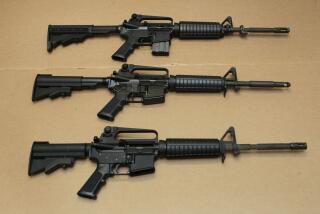Communities’ Liability Suits Against Gun Makers Falter
- Share via
WASHINGTON — When cities and counties first began filing lawsuits against the firearm industry two years ago, some gun control advocates hoped the nation’s courts would act quickly to help reduce the gun-related violence that has plagued urban areas.
Similar to state lawsuits against tobacco companies, the litigation was aimed at recovering millions of dollars in medical and law enforcement costs resulting from gun-related violence. Plaintiffs also sought to force firearm makers to produce safer guns and to keep them from children and criminals.
But with 32 cities and counties now having initiated lawsuits, it is clear that success will come slowly, if at all. Some suits have been dismissed outright. Others, including 12 filed by communities in California, are proceeding slowly. And while federal officials brokered an early settlement with one gun maker, other manufacturers have refused to change their marketing or production practices.
In general, the complaints charge that gun manufacturers, distributors and trade associations are supplying firearms to an illegitimate market, creating a public and private nuisance and failing to incorporate adequate warnings and technologically feasible safety features.
In August, the Ohio state Court of Appeals upheld the dismissal of Cincinnati’s lawsuit, ruling that the city could not recover costs incurred from criminal and accidental shootings. To rule otherwise, the court said, “would open a Pandora’s box”--likening it to suing “the manufacturers of matches for arson, or automobile manufacturers for traffic accidents or breweries for drunk driving.”
Miami and Bridgeport, Conn., also experienced setbacks in their suits. State judges concluded that those communities suffered only remote injuries not deserving of relief. City and state officials have appealed the rulings.
More recently, an Illinois judge dismissed a $433-million suit filed by Chicago against 38 firearm industry defendants. Cook County Circuit Judge Stephen A. Schiller ruled that police and prosecutors, not the courts, could better address the problem of illegal gun sales.
Robert Delfay, president of the National Shooting Sports Foundation, the industry’s major trade group, notes that gun makers already are governed by federal and state regulations meant to keep firearms out of the wrong hands.
“It is out-and-out harassment for politicians to attempt to blame a responsible industry for the criminal misuse of its safe, legal and non-defective products,” Delfay says.
But gun control advocates argue that court judgments are needed to compel firms to make guns safer and to prevent avoidable misuse.
“The gun industry has resisted calls to incorporate locks and other safety systems that would personalize guns and prevent them from being used by children and other unauthorized persons,” says Dennis Henigan, legal director of the nonprofit Center to Prevent Handgun Violence.
“Just as car manufacturers have been held liable for failing to install seat belts and air bags, gun makers should be liable for failing to install feasible safety systems,” he adds.
At least one federal judge seems to agree. In a lawsuit filed by the city of Cleveland, U.S. District Judge Donald C. Nugent ruled in March that public officials have the right to discover how firearm makers design and sell guns.
Since the manufacturers of all other products have an obligation to make and sell their goods safely, Nugent wrote, attempts by gun companies to place their products “above the law” are improper.
So far, only Smith & Wesson has made a deal to change some marketing and manufacturing practices to avoid litigation. The company agreed to install trigger locks, develop “smart guns” that can be fired only by their owners and stop shipments to dealers who refuse to toughen screening of buyers.
Gun suits filed by 12 California communities--including the city and county of Los Angeles--recently were combined and assigned to San Diego County Superior Court Judge Vincent DiFiglia, who has denied the gun industry’s motion for dismissal.
In Michigan, judges also have denied motions by gun makers to dismiss municipal lawsuits, allowing actions by Wayne County and the city of Detroit to move forward.
Henigan, whose organization is assisting lawyers in 24 of the suits, said the rulings “establish the principle that the gun industry can be held accountable for putting profit ahead of public safety.”
More to Read
Sign up for Essential California
The most important California stories and recommendations in your inbox every morning.
You may occasionally receive promotional content from the Los Angeles Times.













